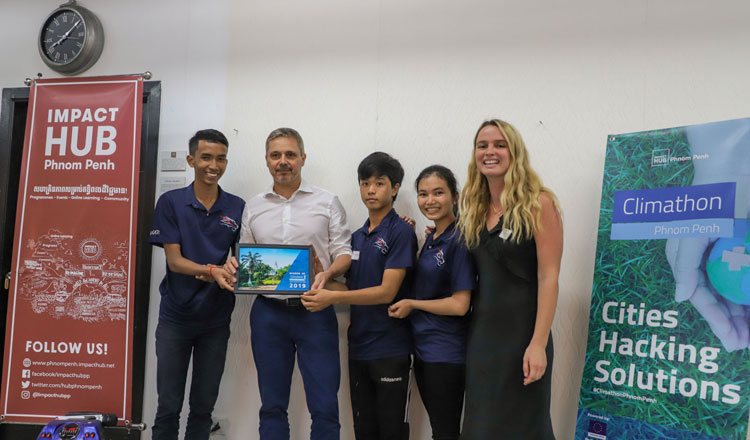Last Saturday, 50 young entrepreneurs and students took part in a global competition to address the urgent issue of climate change.
For in depth analysis of Cambodian Business, visit Capital Cambodia
.
Phnom Penh’s Impact Hub played host to the contestants, along with the Delegation of the European Union for a one-day hackathon designed to stimulate the brains of the best and brightest to find innovative solutions to everyday ecological problems.
Last week’s hackathon was part of ‘Climathon’ – a year-round programme that takes place worldwide, initiated by EIT Climate-KIC in a bid to push Europe’s climate diplomacy further, as well as engaging the next generations of entrepreneurs.
The 50 students and entrepreneurs were divided into eight teams – each of which was assigned a mentor from a range of organisations familiar with the issues. Representatives from the EU Delegation, Global Green Growth Institute, EnergyLab and GoGreen Cambodia assisted the Cambodian entrepreneurs who were given 10 hours to tackle one of four issues.
The challenges included very real issues that Cambodia must face, from the reduction of single-use plastics to the need for clean energy, cleaner air and the potential for environmental change via technology.
Over 10 million plastic bags are used in Phnom Penh alone every single day, according to the UN Development Programme.

As Cambodia’s hunt for oil continues, last year renewable energy made up 62 percent of the Kingdom’s installed electricity capacity, although the majority of this came from hydroelectric dams, which many now fear are decimating the ecosystem along the Mekong.
Tackling these timely issues, the winning group included three students from Liger Leadership Academy.
“Liger is all about contextualised learning and the students understanding how they can develop their country, but also where it fits in a global context because climate change is not only significant in Cambodia, it’s significant around the world,” explains Dom Sharpe, country director at Liger Leadership Academy.
“For us we don’t have experts on everything at Liger, so we use the world as our classroom and we need to engage in these opportunities outside of Liger for our students to really compete in an authentic competition to see where their ideas can take them.”
Beating out the other seven groups, the students put forth a plan to create a consulting agency that’s geared towards energy efficiency and data analysis. Their aim to help smaller organisations and businesses find means of saving costs in an environmentally sustainable way impressed the judges, given the context of Cambodia where 97 percent of businesses are small to medium enterprises.
For their efforts, the team was rewarded $500 from the Delegation of the EU and Impact Hub will grant the students a six-month support programme that consists of twice-monthly masterclasses, mentoring sessions and access to Impact Hub’s network of entrepreneurs and investors.
“Where these ideas will lead, in the next six months, that’s a question that no-one can answer, but I think the only thing you can be sure of is that it goes nowhere if nobody tries to do something now. For these students to be involved and have this mentorship, the very least it does is really push them into understanding the real world problem – it’s not a competition they going to try and win it’s a global solution they’re trying to solve,” says Sharpe.




